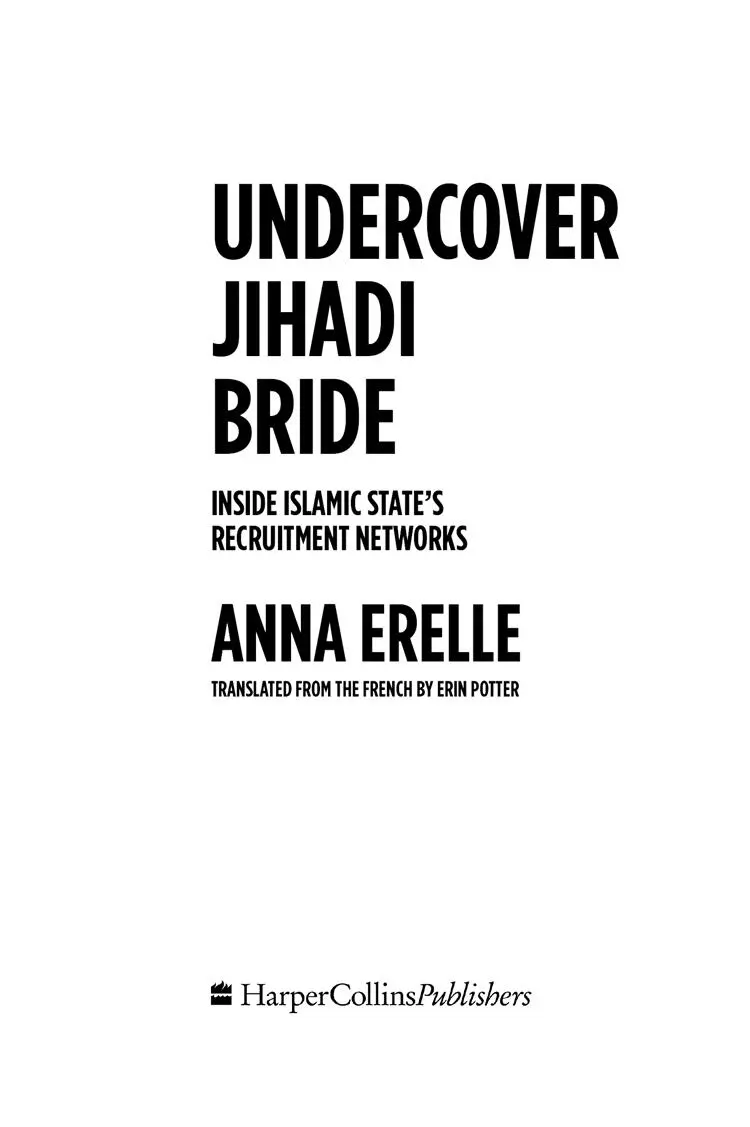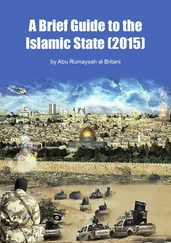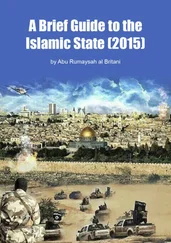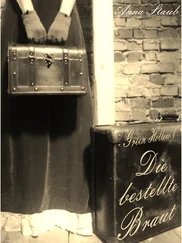
HarperCollins Publishers
This eBook first published in Great Britain as In The Skin of a Jihadist by HarperCollins Publishers in 2015
Copyright © 2015 by Anna Erelle
English language translation © HarperCollins Publishers
Originally published in France in 2015 by Éditions Robert Laffont under the title Dans la peau d’une djihadiste
Anna Erelle asserts the moral right to
be identified as the author of this work
A catalogue record for this book is
available from the British Library
Cover photography posed by a model and in no way related
to any of the people or events portrayed in this book.
All rights reserved under International and Pan-American Copyright Conventions. By payment of the required fees, you have been granted the non-exclusive, non-transferable right to access and read the text of this e-book on-screen. No part of this text may be reproduced, transmitted, down-loaded, decompiled, reverse engineered, or stored in or introduced into any information storage and retrieval system, in any form or by any means, whether electronic or mechanical, now known or hereinafter invented, without the express written permission of HarperCollins
Source ISBN: 9780008139568
Ebook Edition © May 2015 ISBN: 9780008139575
Version: 2016-01-07
FOR ÉRIC AND NOËL
FOR PAULINE AND JÉRÔME
Only voluntary, inspired self-restraint can raise man above the world stream of materialism. . . . Even if we are spared destruction by war, our lives will have to change if we want to save life from self-destruction.
ALEKSANDR SOLZHENITSYN, “A WORLD SPLIT APART,”
HARVARD UNIVERSITY COMMENCEMENT ADDRESS, JUNE 8, 1978
The following events took place during the spring of 2014, two months before the Islamic State occupied Mosul, the second-largest city in Iraq, and its leader, Abu Bakr al-Baghdadi, declared a worldwide caliphate.
Cover
Copyright
Dedication
Epigraph
Paris, ten days earlier
The same night
Saturday morning
That night
Sunday night
Monday
Monday, 8 p.m.
Monday, 9:30 p.m.
Mélodie
Thursday
Thursday, 10 p.m.
A few days later
In the afternoon
The same day, 5:30 p.m.
Monday, 7:30 p.m.
Monday, 8 p.m.
Two days later
The next day
Thursday
Friday
Four days later
Wednesday night
Early the next morning
Friday the 25th
Amsterdam, Friday, 6 p.m.
Friday, 9 p.m.
Friday, 10 p.m.
Saturday morning
Paris, Sunday afternoon
Two days later, at the magazine
The same day, in the evening
Five days later
Tuesday
Eight months later
About the Author
“Listen to me! I love you more than I’ve loved anyone. You should be here with me. I can’t stand to think of you in that corrupt country. I’ll protect you. I’ll shelter you from the world’s evils. When you come to live with me, you’ll see what a paradise me and my men are building. You’ll be amazed. Here, people care about each other. They respect each other. We’re one big family, and we’ve already made a place for you—everyone is waiting for you! You should see how happy the women are here. They used to be like you—lost. One of my friends’ wives has arranged a program for your arrival. After your shooting lessons, she’ll take you to a very beautiful store, the only one in the country that sells fine cloth. I’ll pay for everything. You’ll establish your own little world here with your new friends. I’m so excited for you to be here. Mélodie, my wife! Hurry up; I can’t wait.”
Mélodie stares into her computer screen, admiring the strong man eighteen years her senior. She loves him, even if she’s only ever seen him on Skype.
“Do you really love me?” Mélodie murmurs, her voice childish and frail.
“I love you for the sake of Allah. You are my treasure, and the Islamic State is your home. Brick by brick, we’ll build a better world, a place where kafir s *won’t be allowed, and we’ll carve a name for ourselves in history. I’ve found a huge apartment for you! If you bring friends, I’ll find an even bigger one. You’ll take care of orphans and the wounded during the day, while I’m fighting. We’ll spend our evenings together . . . insha’Allah* .”
Mélodie feels loved. She feels useful. She’s been looking for purpose in her life: now she’s found it.
I was frustrated that Friday night as I left the editorial offices of a magazine where I do freelance work. The paper had received a letter from a lawyer forbidding me from publishing an article I’d written about a young female jihadist. I had just spent two days in Belgium with Samira, the girl’s mother. Her daughter ran away to Syria a year before to join Tarik, the man of her life and a fanatic devoted to the Islamic State’s cause. Naïve and blind with emotion, Leila *wanted to live with her great love. A bullet to the heart ended his twenty years and one spring. Samira was hopeful when she learned of the death of the man she’d been forced to consider her son-in-law. With Tarik dead, Samira saw no reason for her daughter to stay in the tragically war-torn country, but Leila was clear: she now belonged to that sacred land and wanted to do her part in the fight to create a religious state in the Middle East. With or without her husband. Tarik had been an emir, *which meant his widow was well taken care of. People respected her, and Leila asked her mother, “Why should I go back?”
Local news sources had picked up the story and begun comparing the eighteen-year-old jihadist to the black widow, a prominent figure in the world of international terrorism and the wife of the man who assassinated Ahmad Shah Massoud. *Samira’s love for her daughter was great, and her response to the situation swift, but she was coming up against an immense challenge. Not only did she have to find a way to repatriate Leila to Belgium; she also had to prove to the authorities that her daughter was living in one of the most dangerous countries on earth for humanitarian reasons. Otherwise, Leila would be considered a threat to domestic security and sent to prison, before potentially being banned from setting foot in her own country.
That was when Samira’s and my paths crossed. Journalism can lead a person to many things, sometimes to the aid of a distressed mother. Samira was beside herself, and she’d turned to Dimitri Bontinck, a former member of the Belgian Special Forces who famously managed to repatriate his own son from Syria. Dimitri is a source of hope for all these European families who wake up one morning to the harsh realization that even those they’d least suspect, even their own teenagers, could be jihadists. After his personal experience, Dimitri became a tireless crusader, volunteering for virtual suicide missions to save other youths—or at least dig up concrete information to help their families. Aware of the risks that Leila faced for being branded the “new black widow,” he’d asked me to meet her mother. I’m a journalist, and though I’m keenly interested in geopolitics, I’m not an expert. However, I’ve always been drawn to erratic behavior, whatever the cause—religion, nationality, social milieu. I’m fascinated by what motivates people to make fatal decisions. Sometimes it’s drugs. Sometimes it’s crime or marginality. I’ve also done a lot of work on radical Islam. Back then, I’d been studying European jihadists in the Islamic State for about a year. There were many similarities between the successive cases, but I was interested in understanding what it was that made each individual decide to give up everything and brave death for this cause.
Читать дальше













